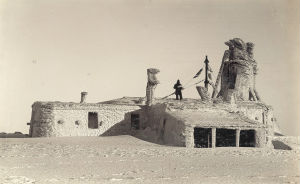US China trade relations, Brexit impact and Ben Nevis weather data – Reading in the news Tues 27 Mar
27 March 2018

US China trade relations: Prof Rajneesh Narula (Henley Business School) is interviewed on BBC World discussing Trump's trade tariffs on China.
Ben Nevis weather station: BBC Online has a feature on how weather data from the top of Ben Nevis is helping us understand more about the effects of climate change. The story recounts how weather was collected by a team of dedicated scientists in the 1800s and how a weather station recently installed is recording live data to make comparisons to the historical recordings. The project, run by the NERC National Centre for Atmospheric Science (NCAS), is led by Prof Ed Hawkins (Met).The BBC story was syndicated on Cetus News. Read our story here.
Brexit impact: Vice-chancellor Sir David Bell spoke to BBC Radio Berkshire (approx. 9 mins in) about the impact Brexit could have on universities. The interview is trailed on the station throughout the day.
Flood control: An article in the Telegraph looking at the ways in which the UK is preparing for flooding in the face of extreme weather quotes Prof Hannah Cloke (GES). The article is syndicated on Yahoo News UK.
Are pickled foods good for you?: Wired.co.uk explores the current trend for pickling foods and whether or not this is good for you. Prof Glenn Gibson (Food) provides expert comment for this story.
Expanding the mind: A profile piece in The New Yorker on philosopher Andy Clark explores his theory of people using technology to enhance their mind and thoughts. The piece mentions Clark's fascination with the work of Professor Kevin Warwick (Emeritus Professor), who implanted a micro-chip in his arm to control lights, doors and heating in the building he worked in.
Why whales are so big: National Geographic reports on a new study into why marine mammals are so large. Dr Chris Venditti (Ecology and Evolutionary Biology) was not involved in the study but says that animal body size is important to measure because it relates to many other characteristics.
Helping hand: Henley Business School Malaysia has made a full scholarship offer to stateless girl, who hit headlines in Malaysia last week because she is unable to apply to university because she is not currently classed as a citizen. The story is reported in MSN Malaysia, Yahoo News Singapore, Malaysian Digest, Malay Mail and TODAY Online.
Less fatty lamb: A study by the University of Reading, led by Dr Kirsty Kliem (APD), has indicated that common British plants could have a positive effect on raising lambs with healthier fat levels. The research is covered by Meat Management. Read our story here.
Discovering new clouds: A blog by Dr Graham Marlton (Met) for The Conversation is a sky-spotter's guide to discovering new ‘species' of cloud. The blog is syndicated on Indilens News Times.
Transform Awards Europe: The University was highly commended in the ‘Best visual identity in the education sector' category at the Transform Awards Europe. Transform Magazine reports.
New UK Centre for Research on Energy Demand: Reading is among a number of institutions that make up the new UK Centre for Research on Energy Demand (UKCRED), to develop and deliver internationally leading research, focusing on energy demand. The news is reported in EurekAlert, Alpha Galileo and Oil Voice, and also on local radio station The Breeze. Read our news story here.
Other coverage:
- Prof Roberta Gilchrist's (Archaeology) article for The Conversation about Glastonbury Abbey, and why the site is revealing new truths about the origins of Christianity in Britain, appears on Sight Magazine.
- Further coverage of research into yoghurt and children's diets in AboutMyArea.
- Horticulture Week has run an article on keeping the plant disease Xylella out of the UK. It references a funded PhD, in association with the University, on better understanding the disease.
- Further coverage following a presentation by Dr Jane Parker (Food) at the National Meeting & Exposition of the American Chemical Society on making smoked food healthier, in Science Alert, Food and Wine and The News Wheel. Seattle and LA radio stations also picked up the news.
- A column in The Irish Examiner on the bird species bramblings features Prof William Lockwood's (former Prof of Philology) explanation of where the name comes from.
- Former art student Julie Collins is to have her work featured in a London exhibition this April. IOM Today reports.
- The Breeze and BBC Radio Berkshire (approx. 1 hour 40 min ins) cover the donation of fragments from Hiroshima University to mark the relationship between them and UoR following the atomic bomb blast in 1945. Read our news story here, and read more about how the University was involved in supporting Hiroshima University after 1945 here.
- Readers' Digest features an article on why sugar is bad for us - it references a 2015 study Reading was involved with which found that people who ate a lot of sugar were likely to be overweight.
- An EcoWatch article on low levels of Arctic sea ice features a chart produced by Prof Ed Hawkins (Met) showing how the Arctic sea ice extent has declined.
- A blog on Scary Mommy references research that Reading was involved with which found that encouraging children to take safe risks means they are less likely to develop anxiety problems.
- Northwest Arkansas Democrat Gazette covers research which has found that animals have a an innate sense of counting. The article makes reference to research by Prof Mark Pagel (Ecology and Evolutionary Biology) who discovered that numbers are some of the most enduring words of all time. The article also appears on Arkansas Online. Read our news story here.
- Ucan2magazine reports on research being undertaken by autism charity Austistica in conjunction with the University of Reading. The three-year study, led by Dr Teresa Tavassoli (Psychology) aims to discover ways to reduce anxiety and understand sensory processing in autism.
